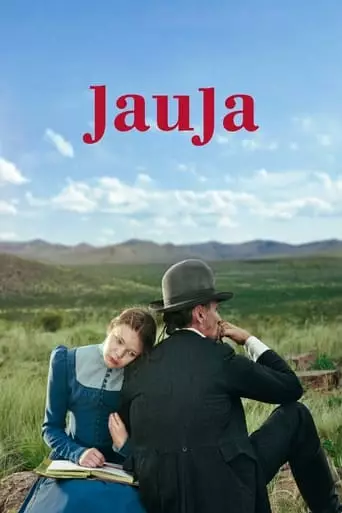A father and daughter journey from Denmark to an unknown desert that exists in a realm beyond the confines of civilization.
Jauja (2014), directed by Lisandro Alonso, is a meditative and haunting film set in the vast, barren landscapes of Patagonia in the 19th century. The film centers on Captain Gunnar Dinesen (Viggo Mortensen), a Danish military engineer who accompanies his daughter, Ingeborg, on an expedition. The film’s narrative begins as a seemingly straightforward tale of a father and daughter traveling through the desert. However, it takes a surreal turn when Ingeborg runs away with a local soldier, leaving her father in search of her across the vast and uncharted wilderness.
The narrative slowly unravels into a dreamlike exploration of isolation, loss, and the human desire for control over an unpredictable world. As Gunnar pursues his daughter, he ventures deeper into the unknown, grappling with existential doubts and confronting the limits of his control. The film shifts between a physical and psychological journey, culminating in a striking, ambiguous ending that leaves much to interpretation.
Analysis
The film’s use of the barren landscape is central to its atmosphere, with the vast, empty desert reflecting the emotional desolation of the characters. The desert is not just a backdrop but a participant in the film’s exploration of themes such as alienation, power dynamics, and human endurance. Alonso’s cinematic style, with its long takes and meticulously framed shots, adds to the sense of unease, as the viewer is often left in suspense, unsure of what might happen next.
The pacing of Jauja is deliberate, slow, and contemplative. It builds a sense of surrealism, where reality and dream-like sequences blur together. Alonso invites the audience to immerse themselves in this ambiguous world rather than providing straightforward explanations. This sense of lost direction, both literally and metaphorically, underlines the disorientation felt by the protagonist.
Viggo Mortensen’s portrayal of Gunnar is stoic yet vulnerable. His character’s journey becomes one of self-discovery, revealing that his search for his daughter is also a search for meaning in a world that seems indifferent to his existence. Mortensen’s performance, alongside Alonso’s direction, adds layers of tension and melancholy to the film.
Themes
- Isolation and Alienation: The expansive landscapes symbolize both literal and emotional isolation. Gunnar’s journey reflects his growing sense of alienation, not only from his daughter but also from his identity and purpose.
- Control and Power: Gunnar’s belief that he can control his environment and circumstances is continually tested. His pursuit of his daughter and his overconfidence in the harsh, unpredictable terrain mirrors human attempts to control the uncontrollable.
- Existentialism: The film engages with existential themes, particularly the absurdity of life and the human struggle to find meaning. The endless desert becomes a metaphor for existential emptiness, where any search for meaning is futile.
- Colonialism and Identity: While not explicitly discussed, the film’s setting and Gunnar’s role as a foreigner in a strange land can be interpreted as a commentary on colonialism and cultural imposition. Gunnar’s inability to understand or control the environment symbolizes the limitations of colonial powers.
- Gender and Freedom: Ingeborg’s disappearance and the freedom she finds in her escape from her father’s control serves as a pivotal moment in the narrative, drawing attention to gender roles and the desire for personal autonomy in a restrictive society.
10 Reasons to Watch “Jauja”
- Stunning Cinematography: The film is visually striking, with its breathtaking shots of the Patagonian desert, making it a must-watch for cinephiles interested in landscape and frame composition.
- Unique Narrative Structure: The film’s unconventional, slow-building story and surreal elements provide a refreshing break from typical narrative styles.
- Philosophical Depth: Jauja offers a profound exploration of existential themes and the search for meaning, ideal for those who appreciate films that challenge their thinking.
- Viggo Mortensen’s Performance: Mortensen gives a subtle yet powerful performance that anchors the film, bringing depth to his character’s emotional and psychological journey.
- Historical Context: Set in the 19th century, the film offers a historical perspective on colonial exploration in South America, enriching its thematic complexity.
- Rich Symbolism: Every frame is filled with symbolism, from the desolate landscapes to the characters’ interactions, making it a film that rewards multiple viewings.
- Cultural Reflection: The film explores the clash of cultures, with Gunnar representing European colonial influences and the indigenous land serving as a powerful counterpoint.
- Dreamlike Atmosphere: The film’s ethereal, almost hallucinatory quality immerses the viewer in a world that feels both familiar and otherworldly.
- Slow-Burn Suspense: The tension builds gradually, making each new twist feel earned and heightening the impact of the film’s more surreal moments.
- Open to Interpretation: Jauja is not a film that hands you easy answers. It encourages viewers to engage with its open-endedness, fostering deep discussions and diverse interpretations.
What You Will Feel After Watching “Jauja”
After watching Jauja, you may experience a sense of ambiguity and contemplation. The film is deliberately cryptic, and its slow pace invites introspection. You might feel a mixture of awe and confusion as you ponder its symbolic layers. The haunting desert imagery and existential undertones can leave you feeling unsettled but intellectually engaged. It’s a film that challenges you to think about human nature, identity, and the limits of control. Overall, Jauja is a thought-provoking experience that lingers long after the credits roll, leaving you reflecting on its themes and your own place in the world

